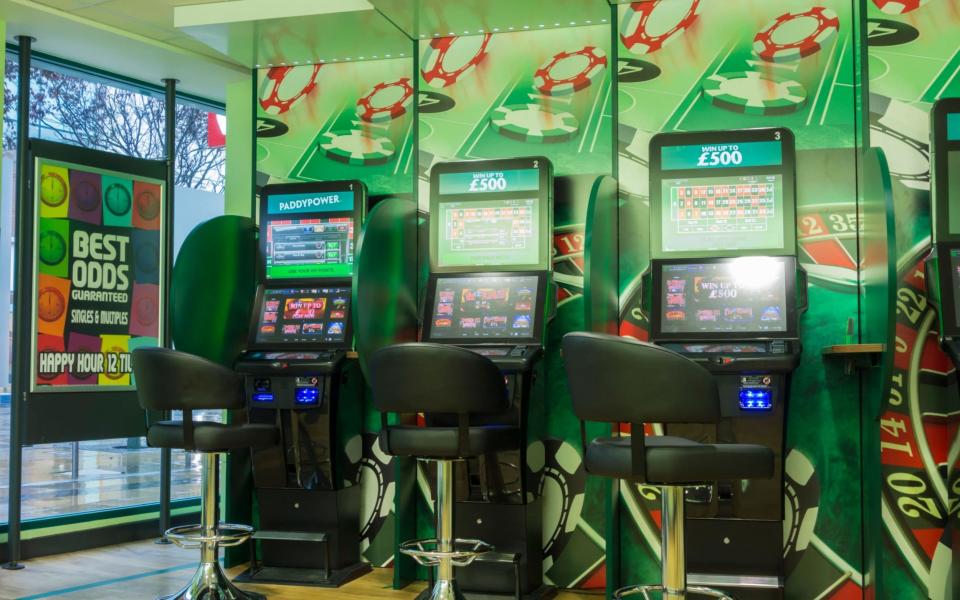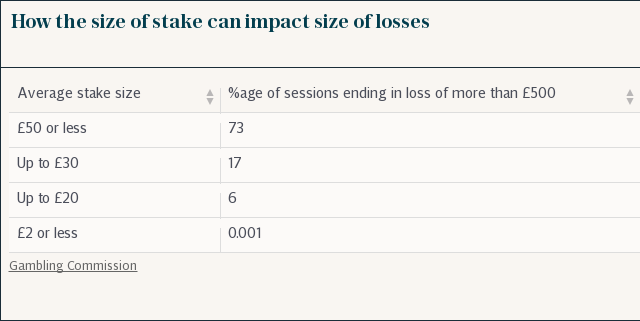Gambling watchdog calls for £30 upper limit on machines

Investors in gambling companies won some relief on Monday as the industry watchdog suggested much less harsh restrictions on controversial betting machine stakes than anticipated, but the crackdown is expected to knock high street bookies nonetheless.
The Gambling Commission recommended setting the maximum stake for fixed odds betting terminals (FOBTs) at £30, a higher cap than campaigners had sought, and £10 more than what many in the industry had privately predicted, sending the share prices of British bookmakers up.
A FOBT is a touch-screen machine that allows players to bet on the outcome of various games such as roulette. The machines are known as the “crack cocaine” of gambling because they allow punters to stake as much as £100 in a single 20-second flutter.
The watchdog also recommended that the stake on gambling machines offering slots games, such as traditional fruit machines, should be limited to £2.
The Government must now decide whether to implement the commission's recommendations.
In October it indicated that it would reduce the maximum stake on in-shop FOBTs to between £2 and £50, from £100 previously, to help tackle problem gambling.
A Government impact assessment at the time estimated that the average cost to the economy of a £30 stake limit would be £1.7bn over the next 10 years, while the cost to the industry of the watchdog's recommendation would be £235m.
A spokesman for the Department for Digital, Culture, Media and Sport said: "We welcome the Gambling Commission's advice and will be considering it alongside responses to our consultation before making a final decision. We have been clear that FOBT stakes will be cut to have a safe and sustainable industry where vulnerable people are protected."

The gambling watchdog also suggested banning the ability for machines to allow different categories of games to be played in one session.
It said that there was also a case for running a trial to assess the costs and challenges of tracking play on gaming machines with £2 and £5 maximum stakes, which are not currently closely monitored.
The Gambling Commission also suggested that the industry works with it and others to make playing times and monetary limits "more effective".
Gambling Commission chief executive Neil McArthur said: “In our judgement, a stake cut for fixed odds betting terminals alone doesn’t go far enough to protect vulnerable people. That is why we have recommended a stake cut plus a comprehensive package of other measures to protect consumers.
“We have proposed actions that will tackle both the risk of harm and provide solutions that are sustainable in the longer term.”
Grant Humphrey of EY said the Gambling Commission's decision "deals another blow to the future of the high street, which is already suffering with a recent spike of chain restaurants and retail closures".
He said "a £30 maximum stake may lead to shop closures and job losses and could lead to a wave of industry consolidation to offset these risks”.

A spokesman for the Association of British Bookmakers said it was considering the Gambling Commission's advice and recommendations, adding: "We fully understand that there is public concern and that there will be a stake cut to reduce the levels of losses on machines in betting shops."
The Government began looking into FOBTs in 2016, requesting evidence on the number and location of terminals, and what measures were in place to protect players.
Campaigners against the betting machines, including MPs, city mayors, academics and senior clerics - sent Prime Minister Theresa May a letter in January to urge the Government to cut the stake to £2.
Charity GambleAware said: “This Gambling Commission’s report makes up an important part of the policy making process, and we welcome their contributions to the ongoing discussion."
A rumour in January that stakes would be slashed to £2 sent shares in prominent bookmakers, which make a significant chunk of their income from the machines, tumbling. William Hill had £320m wiped off its market capitalisation while Ladbrokes lost £300m from its value.
Shares in the high street bookies rose on Monday, with William Hill and Ladbrokes Coral up 3pc each.

 Yahoo Finance
Yahoo Finance 